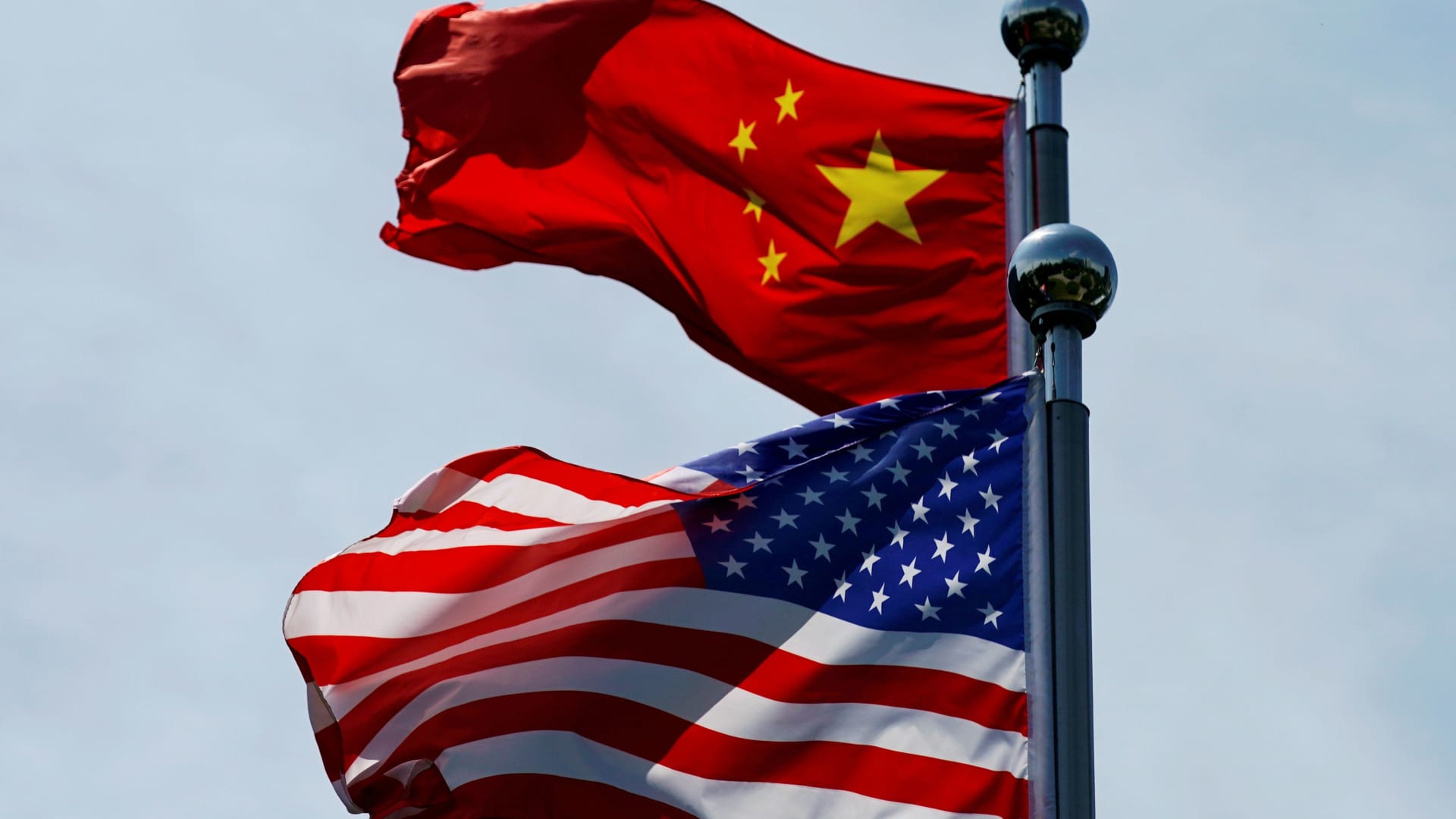Chinese and U.S. flags flutter near The Bund, before U.S. trade delegation meet their Chinese counterparts for talks in Shanghai, China July 30, 2019.
Aly Song | Reuters
BEIJING — Donald Trump’s 2024 presidential win has raised the bar for China’s fiscal stimulus plans, expected Friday.
On the campaign trial, Trump threatened to impose additional tariffs of 60% or more on Chinese goods sold to the U.S. Increased duties of at least 10% under Trump’s first term as president did not dent America’s position as China’s largest trading partner.
But new tariffs — potentially on a larger scale — would come at a pivotal time for China. The country is relying more on exports for growth as it battles with a real estate slump and tepid consumer spending.
If Trump raises tariffs to 60%, that could reduce China’s exports by $200 billion, causing a 1 percentage point drag on GDP, Zhu Baoliang, a former chief economist at China’s economic planning agency, said at a Citigroup conference.
Since late September, Chinese authorities have ramped up efforts to support slowing economic growth. The standing committee of the National People’s Congress — the country’s parliament — is expected to approve additional fiscal stimulus at its meeting this week, which wraps up Friday.
“In response to potential ‘Trump shocks,’ the Chinese government is likely to introduce greater stimulus measures,” said Yue Su, principal economist at the Economist Intelligence Unit. “The overlap of the NPC meeting with the U.S. election outcome suggests the government is prepared to take swift action.”
She expects a stimulus package of more than 10 trillion yuan ($1.39 billion), with about 6 trillion yuan going towards local government debt swaps and bank recapitalization. More than 4 trillion yuan will likely go towards local government special bonds for supporting real estate, Su said. She did not specify over what time period.
Stock market divergence
Mainland China and Hong Kong stocks fell Wednesday as it became clear that Trump would win the election. U.S. stocks then soared with the three major indexes hitting record highs. In Thursday morning trading, Chinese stocks tried to hold mild gains.
That divergence in stock performance indicates China’s stimulus “will be slightly bigger than the baseline scenario,” said Liqian Ren, who leads WisdomTree’s quantitative investment capabilities. She estimates Beijing will add about 2 trillion yuan to 3 trillion yuan a year in support.
Ren doesn’t expect significantly larger support due to uncertainties around how Trump might act. She pointed out that tariffs hurt both countries, but restrictions on tech and investment have a greater impact on China.
Trump, during his first term as president, put Chinese telecommunications giant Huawei on a blacklist that restricted it from using U.S. suppliers. The Biden administration expanded on those moves by limiting U.S. sales of advanced semiconductors to China, and pressuring allies to do the same.
Both Democrats and Republicans supported the passage of those newer export controls and efforts to boost semiconductor manufacturing investment in the U.S., Chris Miller, author of “Chip War,” pointed out earlier this year. He expected the U.S. to increase such restrictions regardless of who won the election.
China has doubled down on bolstering its own tech by encouraging bank loans to high-end manufacturing. But the country had long benefited from U.S. capital as well as the ability to use U.S. software and high-end parts.
Republicans gained a majority in the Senate for the next two years, according to NBC News projections, though control of the House of Representatives remains unclear.
“If the Republican Party gains control of Congress, protectionist measures could be accelerated, amplifying impacts on the global economy and presenting significant downside risks,” Su said.
She expects Trump will likely impose such tariffs in the first half of next year, and could speed up the process by invoking the International Emergency Economic Powers Act or Section 122 of the Trade Act of 1974, which allows the president to impose tariffs of up to 15% in response to a serious balance-of-payments deficit.
U.S. data shows that the trade deficit with China narrowed to $279.11 billion in 2023, from $346.83 billion in 2016.
Su estimated that a 10% tariff increase on Chinese exports to the U.S. could reduce Beijing’s real GDP growth by an average of 0.3 to 0.4 percentage points in the next two years, assuming other factors remain constant.
China’s exports to the U.S. fell by 14% last year to $500.29 billion, according to customs data on Wind Information. That’s still up from $385.08 billion in 2016, before Trump was sworn in for his first term.
Meanwhile, China’s annual imports from the U.S. climbed to $164.16 billion in 2023, up from $134.4 billion in 2016, the Chinese data showed.
Other analysts believe that Beijing will remain conservative, and trickle out stimulus over the coming months rather than release a large package on Friday.
China’s top leaders typically meet in mid-December to discuss economic plans for the year ahead. Then, officials would announce the growth target for the year at an annual parliamentary meeting in March.
“China will likely face much higher tariff from the U.S. next year. I expect policy response from China to also take place next year when higher tariff is imposed,” Zhiwei Zhang, chief economist at Pinpoint Asset Management, said in a note Wednesday afternoon.
“I also don’t think the government will change the policies they already proposed to the NPC because of US election,” he said.
China’s growing global trade influence
Regardless of tariffs, China remains an export powerhouse to markets outside the U.S.
“Chinese exports have indeed shifted a bit in the past few years in terms of destination, with the U.S. representing less than 15% of total Chinese exports in 2023, compared with nearly 18% on average in the 2010s,” Francoise Huang, senior economist for Asia-Pacific and global trade at Allianz Trade, said in September.
“While China has lost market share in the U.S., it’s clearly been gaining in other places,” she said. “For example, China now represents more than 25% of ASEAN imports, compared with less than 18% in the 2010s.”
China’s exports have also grown to countries that sell to the U.S., a Federal Reserve report found in August.
— CNBC’s Dylan Butts contributed to this report.

 Blog Post7 days ago
Blog Post7 days ago
 Economics1 week ago
Economics1 week ago
 Personal Finance1 week ago
Personal Finance1 week ago
 Finance1 week ago
Finance1 week ago
 Finance1 week ago
Finance1 week ago
 Accounting1 week ago
Accounting1 week ago
 Accounting1 week ago
Accounting1 week ago
 Accounting1 week ago
Accounting1 week ago










